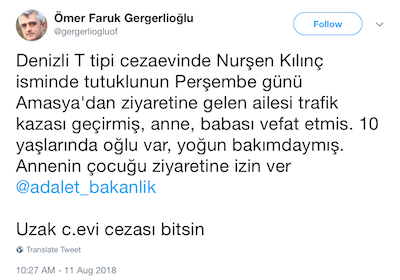Turkish authorities have reportedly refused to allow Nurşen Kılıç, who was imprisoned by the Turkish government as part of it massive post-coup witch hunt targeting alleged members of the Gülen movement, to visit her 10-year-old son in the hospital after he was seriously injured in a traffic accident in which Kılıç also lost her mother and father as they were returning from a visit to her in Denizli’s T-Type Prison on Thursday.
According to a report by online news outlet TR7/24, Kılıç’s family visited her in prison on Thursday and were involved in a traffic accident as they were driving from Denizli to their hometown of Amasya after the visit. Kılıç’s mother and father died in the crash, and her 10-year-old son was seriously injured. He was taken to the intensive care unit of a local hospital. However, the prison administration has refused to allow Kılıç to attend in the funerals of her parents or to visit her son in the hospital.

Four members of the Aydın family had also lost their lives in early March 2018 in a traffic accident while driving from Turkey’s Erzurum province to their hometown of Giresun after visiting a family member incarcerated in Erzurum Prison, part of the Turkish government’s massive post-coup witch-hunt targeting alleged members of the Gülen movement.
Hundreds of thousands of people in Turkey have been the subject of legal proceedings in the last two years on charges of membership in the Gülen movement since the coup attempt in July 2016, a Turkish Justice Ministry official told a symposium on July 19, 2018.
“Legal proceedings have been carried out against 445,000 members of this organisation,” Turkey’s pro-government Islamist news agency İLKHA quoted Turkish Justice Ministry Deputy Undersecretary Ömer Faruk Aydıner as saying.
Turkey survived a controversial military coup attempt on July 15, 2016 that killed 249 people. Immediately after the putsch, the Justice and Development Party (AKP) government along with President Recep Tayyip Erdoğan pinned the blame on the Gülen movement.
Fethullah Gülen, who inspired the movement, strongly denied having any role in the failed coup and called for an international investigation into it, but President Erdoğan — calling the coup attempt “a gift from God” — and the government initiated a widespread purge aimed at cleansing sympathizers of the movement from within state institutions, dehumanizing its popular figures and putting them in custody.
Turkey has suspended or dismissed more than 150,000 judges, teachers, police and civil servants since July 15. On December 13, 2017 the Justice Ministry announced that 169,013 people have been the subject of legal proceedings on coup charges since the failed coup.
Turkish Interior Minister Süleyman Soylu announced on April 18, 2018 that the Turkish government had jailed 77,081 people between July 15, 2016 and April 11, 2018 over alleged links to the Gülen movement.















